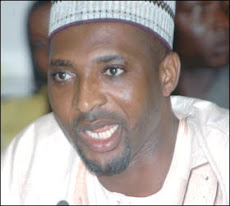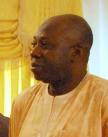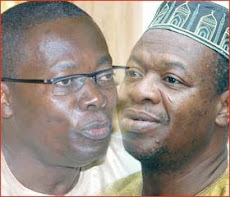




Minority Leader Osei-Kyei-Mensah Bonsu (left)


The Minority in Parliament on Thursday called on President John Atta Mills to investigate the alleged harassment and disregard for the human rights of Ghanaians who led international oil companies to discover oil in the country.
"We specifically wish to point out the unfair and inhumane manner in which a leading Ghanaian partner in KOSMOS, Mr. George Owusu, has been extensively investigated by the Ghanaian law enforcement agencies including conducting many surprise searches in his house, office, going through his computer hard drive and bank accounts."
Mr. Kwame Amporfo Twumasi, Member of Parliament for Nkoranza South and Deputy Ranking Member on Fuel, made the allegation at a press conference organized by the Minority to register their displeasure on some issues in the Mills administration.
The Minority also accused the government of favouring NDC oil companies hurriedly formed to cash in on the importation of petroleum products at the peril of Ghanaians who are suffering as a result of high prices of petroleum products.
They mentioned some of the companies as Manitwoc, Scan Oil, Forrestor, Crest Grade International, Kempac, PetroGhana, Crush Oil Smk Energy, Mafci and Joint Development adding that most of those companies had no track records in the petroleum business.
Mr. Twumasi said the persistent harassment of officials was destroying the investor friendly climate created over the years and appealed to President Mills to also investigate the activities of Ghana National Petroleum Corporation and their relationship with Anandarko's operations in Sierra Leone.
On fuel prices, the Minority accused the Mills administration of being insensitive to the people of Ghana by their frequent increment of prices of petroleum products contrary to the 'drastic reduction of petrol prices' the President promised during the 2008 political campaigns.
"We wish to register our total objection to the five percent increase in the price of petroleum products recently announced by the National Petroleum Authority and to call on President Mills to rescind forthright that decision and instead deliver to Ghanaians what the NDC led by him as the flag bearer promised this nation during the elections campaigns of 2008".
They urged the government to refocus on the development needs of the country and stop shifting blames on the previous Kufuor-led administration as the bane of the economy of the country.
Source: GNA/Ghana
The Minority in Parliament on Thursday called on President John Atta Mills to investigate the alleged harassment and disregard for the human rights of Ghanaians who led international oil companies to discover oil in the country. "We specifically wish to point out the unfair and inhumane manner in which a leading Ghanaian partner in KOSMOS, Mr. George Owusu, has been extensively investigated by the Ghanaian law enforcement agencies including conducting many surprise searches in his house, office, going through his computer hard drive and bank accounts." Mr. Kwame Amporfo Twumasi, Member of Parliament for Nkoranza South and Deputy Ranking Member on Fuel, made the allegation at a press conference organized by the Minority to register their displeasure on some issues in the Mills administration. The Minority also accused the government of favouring NDC oil companies hurriedly formed to cash in on the importation of petroleum products at the peril of Ghanaians who are suffering as a result of high prices of petroleum products. They mentioned some of the companies as Manitwoc, Scan Oil, Forrestor, Crest Grade International, Kempac, PetroGhana, Crush Oil Smk Energy, Mafci and Joint Development adding that most of those companies had no track records in the petroleum business. Mr. Twumasi said the persistent harassment of officials was destroying the investor friendly climate created over the years and appealed to President Mills to also investigate the activities of Ghana National Petroleum Corporation and their relationship with Anandarko's operations in Sierra Leone. On fuel prices, the Minority accused the Mills administration of being insensitive to the people of Ghana by their frequent increment of prices of petroleum products contrary to the 'drastic reduction of petrol prices' the President promised during the 2008 political campaigns. "We wish to register our total objection to the five percent increase in the price of petroleum products recently announced by the National Petroleum Authority and to call on President Mills to rescind forthright that decision and instead deliver to Ghanaians what the NDC led by him as the flag bearer promised this nation during the elections campaigns of 2008". They urged the government to refocus on the development needs of the country and stop shifting blames on the previous Kufuor-led administration as the bane of the economy of the country. Source: GNA/Ghana | |||||||||||||||||||||


















